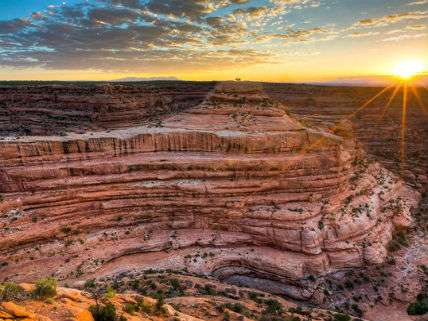Trump Executive Order Could Empower State and Local Governments to Manage Federal Lands
Issues executive order to Interior Department to review national monument designations.

The Bears Ears National Monument was established on 1.3 million acres of federally owned land in southern Utah by President Barack Obama on December 28, 2016 on his way out of the White House. Obama used, or as his critics would say, abused his authority under the 1906 Antiquities Act to make this designation. The Act was adopted chiefly as a way to punish people who were looting prehistoric Indian sites in the West, but has since been used by presidents as way to limit development on various federally owned lands. This order infuriated some local people and politicians including Utah Sen. Mike Lee (R) who told the Salt Lake Tribune: "This arrogant act by a lame duck president will not stand. I will work tirelessly with Congress and the incoming Trump administration to honor the will of the people of Utah and undo this designation."
Heeding these objections, President Donald Trump issued an executive order earlier this week instructing Secretary of the Interior Ryan Zinke to review and determine the appropriateness of national monument designations under the Antiquities Act from January 1, 1996 until now. The order directs the the Secretary to "consult and coordinate with the Governors of States affected by monument designations or other relevant officials of affected State, tribal, and local governments."
How is Zinke's review likely to come out? Terry Anderson, the founder of the free-market Property Environment Research Center* in Bozeman, Montana, reviews Zinke's history with public lands policy in a column published at the Forbes website. Anderson points out that Zinke was a supporter of the Protecting Agriculture, Conservation, and Recreation and Empowering States (ACRES) bill that would limit executive power to unilaterally establish national monuments under the Antiquities Act. Anderson points out that that bill bill would require state governors, adjacent counties and adjacent property owners to approve monument designations.
In addition, Zinke voted for the Residual Federal Forest Act which would allow logging companies to have access to federal forests in order to thin them as a way to prevent massive forest fires. As Anderson notes, "Timber left unmanaged provides tinder for massive wildfires, making it a far bigger threat to wilderness lands than chainsaws."
Anderson also praises Zinke for voting for Self-Sufficient Community Lands Act that would transfer management of millions of acres of federal land to states under a management board appointed by state governors. Zinke, on the other hand, has opposed the transfer of federal lands to local and state governments.
Let us hope that the review will limit federal overreach and enable more local control over federally-owned lands. The final review is due in 120 days.
*Disclosure: I have been the happy beneficiary of grants, conferences, and intellectual enrichment from PERC for many years.
